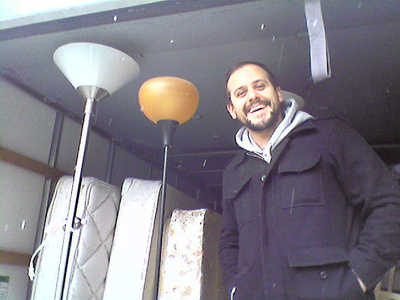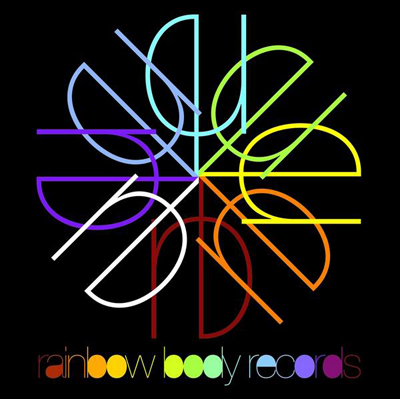Chris Sloan has a daily schedule that would make your head spin, and yet also sounds about for par with most new label heads. He's working by day, attending school by night, and finding an extra half of a day in there somewhere to build up his fledgling label, Rainbow Body Records. For their first release, they've put out the debut EP from locals Golden Birthday, Infinite Leagues. The album is a solid collection of hazy, '80s-leaning pop that you can almost picture John Hughes asking the record store clerk the name of in some alternate universe. Gapers Block: Transmission sat down with Mr. Sloan and a cheap bottle of white wine to discuss monks, the recession, and how to get off on the right foot with your first record label.

Chris Sloan (photo by Dan Morgridge)
Gapers Block: Transmission So you've just released Infinite Leagues. Is it a one-off, or would you consider Golden Birthday one of "your" artists?
Chris Sloan: I would say we're going to be working together again in the future — I've got a really good relationship with the band, and we've been working for a long time together, since their first recordings. I don't think we'll be exclusively working together...I know they're working on a tape with this guy out in New York right now, but as far as their next full-length release goes we're on track to do that together.
GB: What's the business situation? Are you working the Touch and Go/Thrill Jockey style of 50/50 split?
CS: Yeah, split down the middle — after all the costs are recouped, then I — I mean, the label — make a dollar, then they make a dollar.
GB: Are there any other partners in the label right now?
CS: It's just me. I did have a partner at first in the real preliminary states of forming the label, but he ended up being a little bit too busy with his regular job, and he's married, so...yeah.
GB: Where does Rainbow Body come from?
CS: Rainbow Body comes from an article in Discover Magazine a couple years back — I'm sure it's still up on the web somewhere — ( it is — ed.) that I was reading about the soul. It was talking about a theologian who was really interested in this phenomenon — I don't know if its been documented scientifically at all — where a monk would die, and instead of burying the body, they would cover it with a cheesecloth for two weeks, and not disturb it. And during those two weeks, the body gets smaller and smaller until nothing is left but their hair and their fingernails. In the room that their body is being left in, there's all these refractions of light like prisms, as if light were going through crystals — but there weren't any crystals in the room. So that really interested me — and I thought it had a little ring to it — so I thought I'd go with it.

GB: Now you've been fairly active in the Chicago music scene business-wise — weren't you the manager of Golden Birthday for a while?
CS: Well, not officially — I help them out in any way I can. I don't really have an official position like that — but I'll do everything I can to help them get shows or interviews. I've been doing their publicity, but that's also because it's on the label as well. As far as the experience stuff, I interned for a long time with Drag City, and I worked part time at Thrill Jockey doing publicity there — so I got my feet wet in that way.
GB: When did the label start to coagulate into something official?
CS: Late 2006 was when I decided I was really going to put myself to it — I'd been saying I don't have the money, or I'm not ready — but basically when I heard the Golden Birthday songs, I figured "Well if I don't put these out, someone is going to, and I really really like this." And that was a while before their record came out, and a while before I was in a financial place to put it out anyways, so...
GB: So I bet you're glad this recession came around, then.
CS: (laughs) Oh yeah — it's really helping with everything. But I think things are tough for everyone right now.
GB: So do you have a separate bank account and the whole works set up for the label?
CS: Yeah, it's all set up legally — I'm incorporated with the IRS and the state and everything. I'm trying to get it all set up officially at this point so I can learn it now — and hopefully as the label grows, I won't have to learn it then and worry then. For all intensive purposes, it's not needed for a label of this size, but I'm doing it mostly for the lessons involved.
GB: Do you have any prospective bands you're looking at right now?
Well the next band on the plate is called Night Gallery — it's Adam (from Golden Birthday) and Aaron David-Ross who is also in Gatekeeper (sort of an Italian Disco industrial duo in town). It's probably going to be out in about half a year, maybe a little longer for that release. And then after that, we're probably going to put out another Golden Birthday record.
GB: Now for distribution, do you just talk to local record stores, or do you have something bigger worked out?
CS: Well I mean, we're distributed through Carrottop, through Chicago Independent (which was formerly Southern Records) and Thrill Jockey has taken some copies as well. But we also keep tabs on the local stores, and I'm not exclusive with anyone, so we're able to sell direct. The band is pretty accessible — even though they're experimental at the same time — which is kind of what — I don't know if I want to say it's my goal... but right now that's the kind of music I'm interested in: Experimental pop — music that plays with the archetypal song structures of pop music and messes with the different elements. They're selling copies, and they're going on a tour of the East Coast in about a month or two — and hopefully that will go well .
GB: Now, in the current, er, financial climate, do you think can go the traditional indie route of just finding your niche and place on the long tail, in the words of Chris Anderson?
CS: In a way all you can do is have faith in your tastes and kinda put that out there, and hope that people will appreciate that — and sort of see or judge each release on it's own merits. Even though I'm the only person who's officially on the label, there's so many people helping out in all the various respects — managing the website, doing the booking...I've got a lot of help from various people.
GB: But at the same time, no one is relying on it, and it's not anyone's source of bread. That has its benefits — Everyone is doing it for passion.
CS: That's true, definitely.
GB: Do you have any heroes you look up to, label-wise?
CS: I mean, I have a huge respect for the Dans at Drag City, and Bettina at Thrill Jockey — they've been very supportive and given me advice when I've gone to them. So I would say at least locally, those two labels have helped out a lot.
GB: Do you have any aces up your sleeve for promotion/marketing? Any new and exciting twists on the internet to sell the record?
CS: Well, me and the Night Gallery guys have been talking about doing LP-only and then free downloads of the record — that seems to help things spread really quickly. But we're not necessarily committing to that strategy yet — we still have to weigh the pros and cons.
GB: I know Flameshovel has looked into that more, and of course Shellac.
CS: There are different people that have had success with that, so we're definitely keeping it in consideration.
GB: Is there a single for the current album — something you'll be pushing out particularly?
CS: I wouldn't say that there's only one single on it right now — I'd say the track that's probably gotten more play on college radio and that sort of stuff is "Hold Onto Love" — but that was never actually set as the single. There are multiple tracks that could fill that role.
GB: Now are you doing all the promotion yourself as well?
CS: I am — I'm not doing any advertising right now — at the level I'm at right now its not really realistic. I'm doing all the mailings and setting up all the interviews.
GB: And are you reaching out to mostly the Chicago region, or are you looking national as well?
CS: Mostly national — we've sent the record to writers all over the country. Really, we've had great press in Chicago. They've done some interviews with magazines in L.A. and New York too.
GB: How many hours a week do you think you devote to the label?
CS: Probably 20...maybe a little more than that. I come home from work, and then work on label stuff until I head to bed. I have everything set aside in a file cabinet, and I'm trying to keep it pretty separate from my personal life, since I'm not the most organized person in the world — I'm trying to not lose crucial information in the pile of garbage in my room. So far, success.
About the author:
Dan Morgridge is a freelance writer from Ukranian Village. He wishes he had a file cabinet so he would stop using important invoices as coasters.

